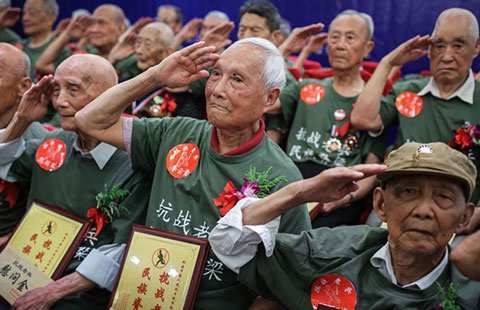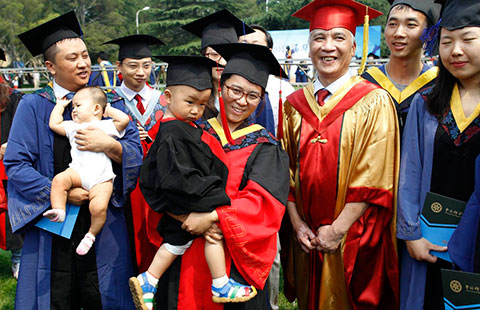US urged to 'correctly perceive China's strategic intentions'
Updated: 2015-07-04 07:37
By CHEN WEIHUA/ZHANG YUNBI(China Daily)
|
||||||||
Beijing has urged Washington to "break away from Cold War thinking and correctly perceive China's strategic intentions" after a US report on Wednesday accused China of adding tension to the Asia-Pacific region.
The 2015 US National Military Strategy, outlined at a news conference on Wednesday by Chairman of the Joint Chiefs of Staff Martin Dempsey, listed China as a possible threat.
"We express discontent and protest the contents in the US report that baselessly hype China's threat," Foreign Ministry spokeswoman Hua Chunying told a news conference on Friday in Beijing.
Although the report said the US supports China's rise and encourages it to become a partner for greater international security, it also accused China's claims in the South China Sea of being "inconsistent with international law".
China has responded on recent occasions that the island construction on the Nansha Islands in the South China Sea is within the realm of territorial sovereignty.
Ruan Zongze, vice-president of the China Institute of International Studies, observed that there is a widespread argument supported by scholars from countries such as the US that "China claims too much in the South China Sea", an opinion that "tries to indirectly force China to make concessions" on issues related to national sovereignty.
The US is also backing the Philippines' international arbitration campaign, Ruan noted.
Ted Carpenter, a senior fellow for defense and foreign policy studies at the Cato Institute, said that by citing Russia and China as two major security threats, the report exhibits a worrisome inability on the part of US military planners to understand the perspective of other countries.
"China and Russia have ample reasons to regard an array of US actions as deeply threatening to their interests," Carpenter said.
Hua said Washington is expected to "meet with the Chinese side halfway" and "follow the important consensus reached by the two leaders in real and concrete terms".
The spirit of no conflict, no confrontation, mutual respect, cooperation and win-win should be honored, and both sides should continue building a new type of relationship between major countries, she said.
"This also serves the US interest," she added.
Jin Canrong, professor of international relations at Renmin University of China, said major problems that may cloud the Sino-US relationship in the near future are strategic mistrust and mutual skepticism.
"The US has always felt that we are challenging it," he said.
Contact the writers at chenweihua@chinadailyusa.com and zhangyunbi@chinadaily.com.cn.
- Injured ROK tourists in intensive care
- 36 dead, 26 missing after banca capsized in C. Philippines
- Thai navy plans to buy three Chinese subs
- Mass casualties in Indonesian military plane crash
- Japan's LDP lawmaker denounces Abe's security policies
- More than 100 feared dead in Indonesian military plane crash

 US beat Japan 5-2 to win Women's World Cup
US beat Japan 5-2 to win Women's World Cup
 Veterans of World War II honored
Veterans of World War II honored
 The world in photos: June 29 - July 5
The world in photos: June 29 - July 5
 Top 10 most expensive cities in the world
Top 10 most expensive cities in the world
 Italian designer tailors success in China
Italian designer tailors success in China
 People take part in Independence Day parade in Washington
People take part in Independence Day parade in Washington
 Unusual heat wave sweeps across Europe
Unusual heat wave sweeps across Europe
 Class of 2015 celebrates in Beijing
Class of 2015 celebrates in Beijing
Most Viewed
Editor's Picks

|

|

|

|

|

|
Today's Top News
Stocks struggle to maintain rally in afternoon trading
Greece enters uncharted territory after referendum 'no' vote
US urged to 'correctly perceive China's strategic intentions'
China brokers pledge 120b yuan to stabilize stock market
For PetroChina, move to Houston pays off
China-France ties 'benefit all'
Concern over US military strategy
Will Alibaba, Amazon clash?
US Weekly

|

|







